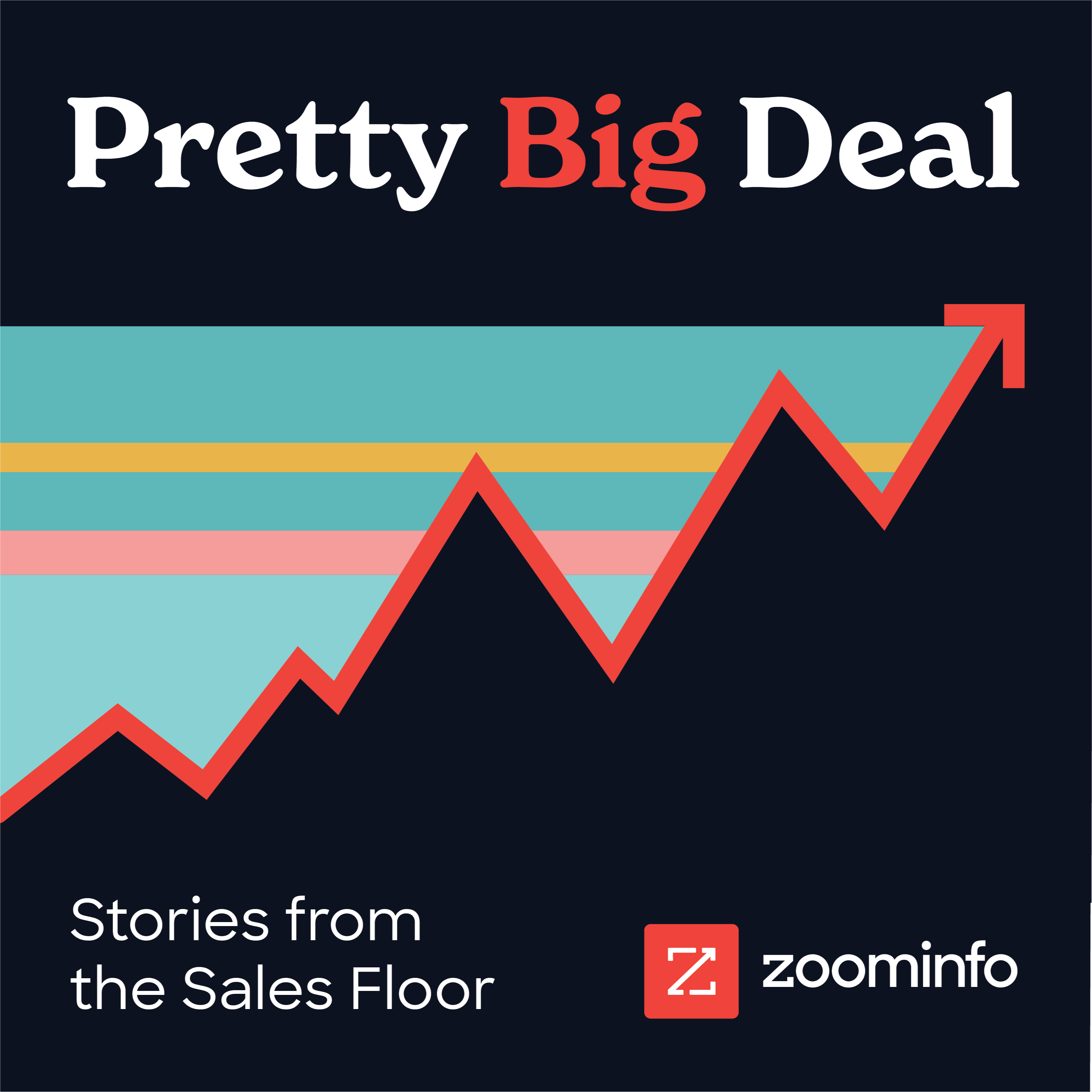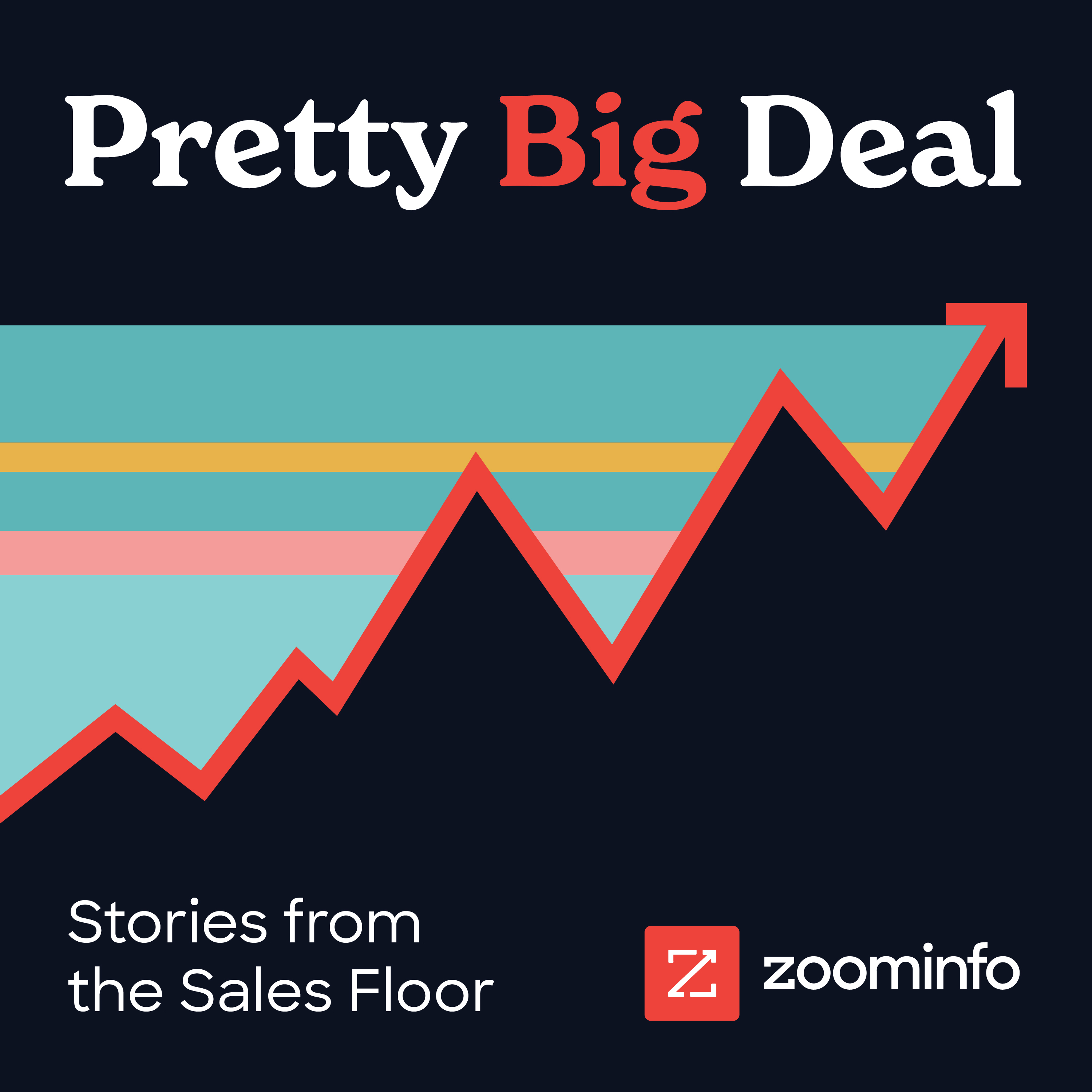Bryan Tunick and the 90% Discount
- 0.5
- 1
- 1.25
- 1.5
- 1.75
- 2
Stepanie Tonneson: Bryan Tunick is a sales manager at ZoomInfo but seven years ago he was working at a start- up as the only salesperson there.
Bryan Tunick: I didn't feel embarrassed in front of my CEO. There was very much a sense of, we've got to take chances. We've got to do whatever we can to get in front of people when you're that size company. No one in a million years would have turned down this meeting.
Stepanie Tonneson: On this week's episode, Bryan tells us about a deal gone wrong.
Bryan Tunick: I just went for a walk. I left the office. I didn't know what to do. I was in a little bit of a state of panic.
Stepanie Tonneson: And what he did to turn things around at the last second.
Bryan Tunick: That became a seven figure account.
Stepanie Tonneson: That and more on this week's episode of Pretty Big Deal.
Bryan Tunick: It's end of the day on a Friday, right, and my CEO and I are meeting. We're wrapping up the week and we decide to send an email to the prospect, the key person at one of these target brands, one of these top 20 brands that we want to go after. So we decide to send an email to the decision maker. We actually found their info in ZoomInfo, not a plug, just the truth. And said, and this wasn't true, but, " Hey, we're going to be in town..." And by the way, they're on the other side of the country. " We're going to be in town next week. We'd love to stop by your offices, sit down and show you what we have to offer." Right. We hit send on it, it was a bold move. We went away for the weekend, totally forgot about it. Tuesday, end of day, we get a response back from them being like, " Yeah, stop by. We've arranged a committee to hear you out." That was pretty wild. We had to scramble and just book flights and obviously, because we told them that would be there. Right. We just wanted the meeting to feel low pressure. So we fly out, super fun to fly out on super short notice, and we get into the meeting room with this company and there's probably about 15 people around the table. We start to do our pitch and as we're pitching people start to get up and leave, one at a time, right. It's a weird feeling, right. And the guy who had invited us in was like, he gave us, " Go on. Go on. Don't be distracted by the fact that they're leaving." So the meeting's going on and people are leaving and we just think, obviously we're thinking in our heads, " This is going terribly." By the end of it, it was the person who had invited us and one other person were left. Right. We later learned that that's just the way that company runs meetings. If someone's not interested or doesn't want to sponsor a project they just leave. So the fact that we had one person at the... at there at the end was actually a good thing. That meant we had an executive sponsor.
Stepanie Tonneson: Was it just you from your company presenting or were there other people as well?
Bryan Tunick: It was me and my CEO. We would run side- by- side for these.
Stepanie Tonneson: So how are you feeling when that was happening?
Bryan Tunick: I mean, being a start- up and being... I didn't feel embarrassed in front of my CEO. There's very much a sense of we've got to take chances. We've got to do whatever we can to get in front of people when you're that size company and no one in a million years would have turned down this meeting, knowing what we knew. I didn't feel pressure from my side but it was like, " Okay, this is a bummer," as that's happening." But then when we got down to just these two people remaining they were like, " Okay, let's go to lunch and really get into this now." So by the end of that lunch we realized we had an executive sponsor, which is really what you need. All pretty standard stuff but where things get really interesting is when we get into procurement, right, and that word probably sent a shudder down anyone's spine who's a sales person who's listening, right. Procurement's always tough.
Stepanie Tonneson: Can you explain what procurement is?
Bryan Tunick: Yeah, absolutely. It could be one of two things, right. Procurement can be, hey the business sponsor has decided they want to go through with this and procurement is just there to shepherd through that last end of the process, the contract review, the maybe a security review and getting the signature. That's the ideal. But unfortunately, more often that not, what procurement really is, is a group of people who are completely detached from the business problem you're solving and that's strategic, right. They don't have any emotional attachment to the problem. They're not thinking, " I need this because it'll help me get out at 5: 00 p. m. or keep my job." They are separate and their job is to basically just beat you up on pricing, beat you up on terms. So it can quite a jarring experience to put it lightly.
Stepanie Tonneson: Right. Okay, so you're saying they get the nuts and bolts of the deal at the last stage and then because they have no attachment to or understanding of why somebody at the company is actually purchasing the product, they can more objectively and unemotionally evaluate the purchase from a financial and logistical standpoint.
Bryan Tunick: Yeah, that's a really optimistic way of looking at it. I think that's the promise. I mean, there are many situations in which procurement professionals are literally compensated based on the number of dollars that they shave off of proposals. So in that case, it's less about evaluating the solution versus the problem. It can be. It can be. There are definitely procurement teams that do that but sometimes it's just about straight negotiations sometimes. And in this case of this story it was literally just a head game to try and really, really beat someone up on price.
Stepanie Tonneson: Whoo. Okay. So bring me back to the story then.
Bryan Tunick: So fast forward six months of sales cycle. So we've been really working on this. We've spec'd it out. We've worked with the agencies that this company's worked with from a design standpoint. A lot of work has gone into this at this stage. Six months, the deal is$300, 000 over three years. So it's just shy of a million overall and that's only for a portion of our product. So there was a lot of also room to grow. Yeah, so it's a high pressure situation. So basically what happened was, they put us into procurement and thinking that we were going to go through a fairly simplistic procurement process, which was on us, my CEO and... not that he should have canceled this anyway, left on his honeymoon. So he's in Croatia on his honeymoon. I'm flying solo. This is a mid- six figure deal, totally will change the direction of the company. And now we get past the procurement. So I'm about to have my first call with procurement. I'm very excited. I think this is where we're going to seal things up. So I get on the phone with procurement and their message essentially to me is, " Thank you very much for this$300, 000 proposal. We intend to work with you but we are... and I won't say their name. I'll call them Acme, Inc. for the purpose of this, if that's cool. " You are a start- up so we're going to pay 10 cents on the dollar but we're going to give you the right to use our logo on your website. That's how we work with companies like you." I did actually, looking back, what I did was reactive but I think it was actually the right thing to do, luckily, which was I got off the phone as quickly as I could. I just said, " Thank you for taking the time to talk. This is a little bit of a bombshell. We're very far apart on terms and I'm just going to... let me get back to you." And I got off the phone as quickly as possible because I think anything I would have said at that point would have just been damaging.
Stepanie Tonneson: So to be clear, the company is saying to you, " We're the big guys. You're the little guy. It's a privilege to you to even have any association with us and to be able to say that you have an association with us. So we're going to ask you for a 90% discount on what would otherwise be a huge deal for you."
Bryan Tunick: Yeah. I mean, the only correction I would make on what you just said is that they didn't ask for anything. It sounded a little bit more like, " We're going to let you retain 10% of the value of this just to be nice and those are our terms." So it was a demand more than anything. I'm just sitting in a little phone booth in a co- working space. I don't know if you've ever been in one of those but I'm in this little 3X3 space. So the pressure is both literal and not. I just went for a walk. I left the office. I didn't know what to do. I was in a little bit of a state of panic, even if I wanted to call my CEO it's already who knows what hour in Croatia at that point. I'm walking and I'm thinking through it and I'm thinking through what procurement is, like we just talked about. And in thinking about that I thought, " I have to go have a conversation with my champion, with my business partner on their side." The person who has skin in the game, right. The person who has committed to their boss that this is a project that's going to get done. The person who's invested resources in it. Go back to that person who also is someone I have a relationship with at this point and say, " Look, we are at risk because of what your procurement team is doing and I haven't called my CEO. He's on his honeymoon, luckily, because he might walk away from this whole thing, right. You and I have to figure something out or we're really at an impasse here." We were at$ 350K at that point in the proposal. He said, " Procurement needs to have a win. What can you do? Let's just cut through it." I said, "$300, 000. I knew that that was hopefully within our range of what we internally had discussed. I said, "$300, 000 is what I can do." He said, " Okay, let me call you back." And then 15 minutes later he called me back and he said, " Okay, it's$ 300,000, moving on." And we moved on with procurement and that was the end of that. So it was a question of leveraging the rapport, making sure that we were talking and continuously dealing with the people who had the pain we were solving for because these other people, again, by design, had no issue almost blowing up the deal because they probably would have gotten some great bonus for getting 90% off the... this is an assumption I'm making but they probably would have gotten compensated well for getting 90% off of our proposal.
Stepanie Tonneson: So you turned what would have been a 90% discount into how much of a discount?
Bryan Tunick: $50,000. inaudible I don't remember the percentage offhand but it shouldn't be too hard to figure out. And then we upsold that same company for another three year, $ 350,000 deal within 90 days. So that became a seven figure account within 90 days of closing that first deal as well.
Stepanie Tonneson: Wow. That is a crazy story.
Bryan Tunick: It was a lot. It was a lot, especially for again, this was early on in my career. It was a lot of responsibility and I'm glad it worked out. That company got acquired and I still have some friends from there and so, look back on it really fondly and still to this day when you read back on the articles about that acquisition they reference that logo. They talk about that logo in all their press and so it's just nice, especially working in a small company to really see the impact and... that a deal can make.
Stepanie Tonneson: What is your advice to other salespeople?
Bryan Tunick: I think the thing to remember is that buyers make plays on salespeople too, right. Too often we take what the buyer says about the price or their budget or their ability to sign a certain term length, we just take those things at face value. I think we have to be willing to accept that it's entirely possible in many cases that both sides are playing a game and if you can get to a level where you can cut through that and find the mutually beneficial terms in a transparent conversation where no one's playing games, that's where you form real partnerships.
Stepanie Tonneson: This episode of Pretty Big Deal featured Bryan Tunick from ZoomInfo and was produced by me, Stephanie Tonneson. If you have a pretty big deal you want to tell us about let us know by writing in to Pretty Big Deal at zoominfo. com. Otherwise, we'll see you on the next episode.
DESCRIPTION
Bryan Tunick is a sales manager at ZoomInfo but seven years ago he was working at a start- up as the only salesperson there. On this week's episode, Bryan tells us about a deal gone wrong. And what he did to turn things around at the last second.


